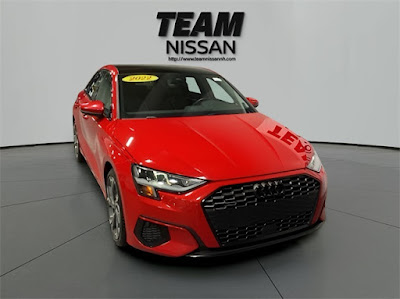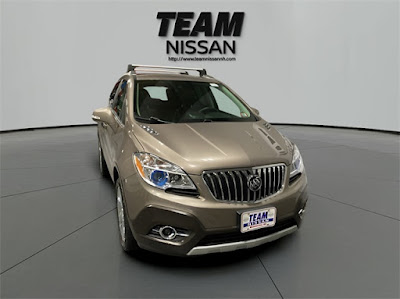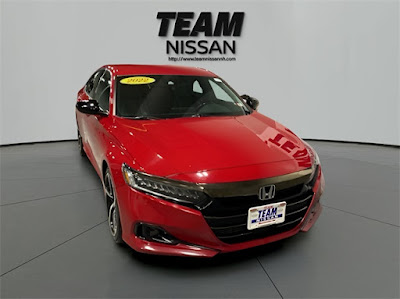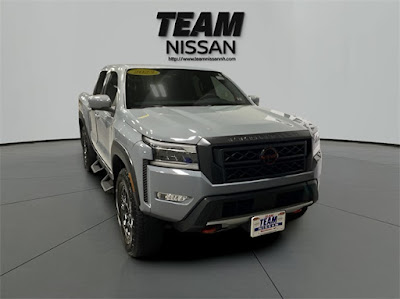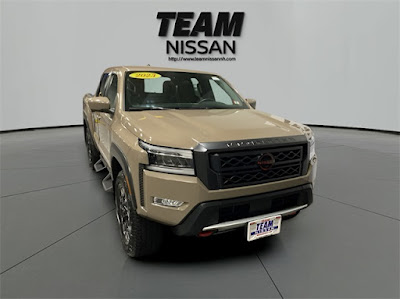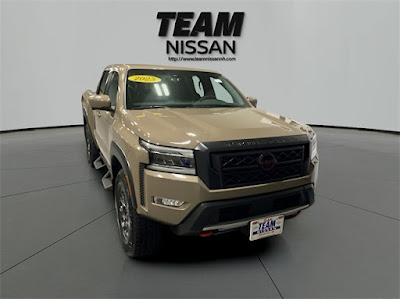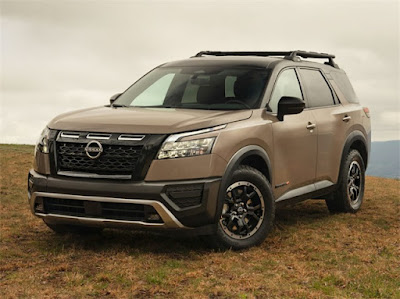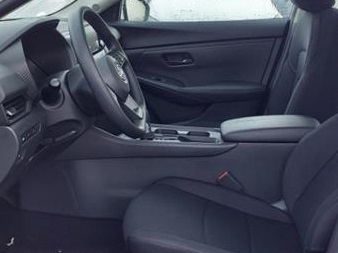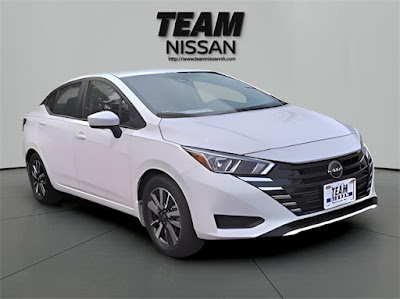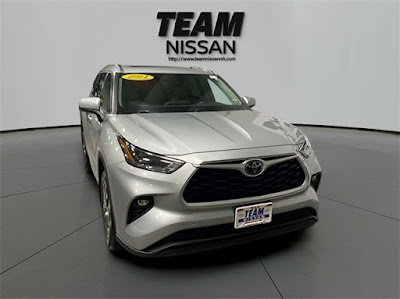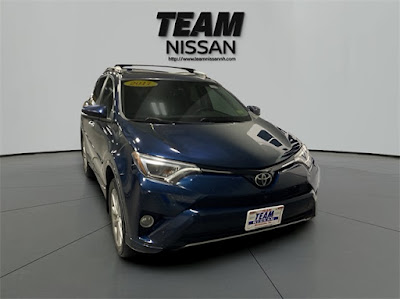Team Nissan Manchester
70 Keller St. Manchester, NH 03103

Overview
Performance
Appearance
Comfort
Safety & Warranty-

More Models 2026 Leaf
2026 Leaf
 2026 Z
2026 Z
 2026 Altima
2026 Altima
 2026 Sentra
2026 Sentra
 2026 Kicks
2026 Kicks
 2026 Murano
2026 Murano
 2026 Rogue
2026 Rogue
 2026 Armada
2026 Armada
 2026 Pathfinder
2026 Pathfinder
 2026 Frontier
2026 Frontier
 2025 Leaf
2025 Leaf
 2025 Ariya
2025 Ariya
 2025 Z
2025 Z
 2025 Altima
2025 Altima
 2025 Sentra
2025 Sentra
 2025 Versa
2025 Versa
 2025 Kicks
2025 Kicks
 2025 Murano
2025 Murano
 2025 Rogue
2025 Rogue
 2025 Armada
2025 Armada
 2025 Pathfinder
2025 Pathfinder
 2025 Frontier
2025 Frontier
 2024 Leaf
2024 Leaf
 2024 Ariya
2024 Ariya
 2024 GT-R
2024 GT-R
 2024 Z
2024 Z
 2024 Altima
2024 Altima
 2024 Sentra
2024 Sentra
 2024 Versa
2024 Versa
 2024 Kicks
2024 Kicks
 2024 Rogue
2024 Rogue
 2024 Armada
2024 Armada
 2024 Murano
2024 Murano
 2024 Pathfinder
2024 Pathfinder
 2024 Frontier
2024 Frontier
 2024 Titan
2024 Titan
 2023 Leaf
2023 Leaf
 2023 Ariya
2023 Ariya
 2023 GT-R
2023 GT-R
 2023 Z
2023 Z
 2023 Altima
2023 Altima
 2023 Maxima
2023 Maxima
 2023 Sentra
2023 Sentra
 2023 Versa
2023 Versa
 2023 Kicks
2023 Kicks
 2023 Rogue
2023 Rogue
 2023 Armada
2023 Armada
 2023 Murano
2023 Murano
 2023 Pathfinder
2023 Pathfinder
 2023 Frontier
2023 Frontier
 2023 Titan
2023 Titan
 2022 Leaf
2022 Leaf
 2022 Altima
2022 Altima
 2022 Maxima
2022 Maxima
 2022 Sentra
2022 Sentra
 2022 Versa
2022 Versa
 2022 Kicks
2022 Kicks
 2022 Rogue
2022 Rogue
 2022 Rogue Sport
2022 Rogue Sport
 2022 Armada
2022 Armada
 2022 Murano
2022 Murano
 2022 Pathfinder
2022 Pathfinder
 2022 Frontier
2022 Frontier
 2022 Titan
2022 Titan
 2021 Leaf
2021 Leaf
 2021 GT-R
2021 GT-R
 2021 Sentra
2021 Sentra
 2021 Altima
2021 Altima
 2021 Maxima
2021 Maxima
 2021 Versa
2021 Versa
 2021 Kicks
2021 Kicks
 2021 Murano
2021 Murano
 2021 Rogue
2021 Rogue
 2021 Rogue Sport
2021 Rogue Sport
 2021 Armada
2021 Armada
 2021 Frontier
2021 Frontier
 2021 Titan
2021 Titan
 2021 NV Cargo
2021 NV Cargo
 2021 NV Passenger
2021 NV Passenger
 2021 NV200 Compact Cargo
2021 NV200 Compact Cargo
 2020 Leaf
2020 Leaf
 2020 370Z Coupe
2020 370Z Coupe
 2020 GT-R
2020 GT-R
 2020 Versa
2020 Versa
 2020 Sentra
2020 Sentra
 2020 Altima
2020 Altima
 2020 Maxima
2020 Maxima
 2020 Kicks
2020 Kicks
 2020 Murano
2020 Murano
 2020 Rogue
2020 Rogue
 2020 Rogue Sport
2020 Rogue Sport
 2020 Pathfinder
2020 Pathfinder
 2020 Armada
2020 Armada
 2020 Frontier
2020 Frontier
 2020 Titan
2020 Titan
 2020 NV Cargo
2020 NV Cargo
 2020 NV Passenger
2020 NV Passenger
 2020 NV200 Compact Cargo
2020 NV200 Compact Cargo
 2019 Leaf
2019 Leaf
 2019 370Z Coupe
2019 370Z Coupe
 2019 370Z Roadster
2019 370Z Roadster
 2019 GT-R
2019 GT-R
 2019 Versa Note
2019 Versa Note
 2019 Versa Sedan
2019 Versa Sedan
 2019 Sentra
2019 Sentra
 2019 Altima
2019 Altima
 2019 Maxima
2019 Maxima
 2019 Kicks
2019 Kicks
 2019 Murano
2019 Murano
 2019 Rogue
2019 Rogue
 2019 Rogue Sport
2019 Rogue Sport
 2019 Pathfinder
2019 Pathfinder
 2019 Armada
2019 Armada
 2019 Frontier
2019 Frontier
 2019 Titan
2019 Titan
 2019 Titan XD
2019 Titan XD
 2019 NV Cargo
2019 NV Cargo
 2019 NV Passenger
2019 NV Passenger
 2019 NV200 Compact Cargo
2019 NV200 Compact Cargo
 2019 NV200 Taxi
2019 NV200 Taxi
 2018 Leaf
2018 Leaf
 2018 370Z Coupe
2018 370Z Coupe
 2018 370Z Roadster
2018 370Z Roadster
 2018 GT-R
2018 GT-R
 2018 Versa Note
2018 Versa Note
 2018 Versa Sedan
2018 Versa Sedan
 2018 Sentra
2018 Sentra
 2018 Altima
2018 Altima
 2018 Maxima
2018 Maxima
 2018 Kicks
2018 Kicks
 2018 Murano
2018 Murano
 2018 Rogue
2018 Rogue
 2018 Rogue Sport
2018 Rogue Sport
 2018 Pathfinder
2018 Pathfinder
 2018 Armada
2018 Armada
 2018 Frontier
2018 Frontier
 2018 Titan
2018 Titan
 2018 Titan XD
2018 Titan XD
 2018 NV Cargo
2018 NV Cargo
 2018 NV Passenger
2018 NV Passenger
 2017 Leaf
2017 Leaf
 2017 370 Z Coupe
2017 370 Z Coupe
 2017 370 Z Roadster
2017 370 Z Roadster
 2017 GT-R
2017 GT-R
 2017 Versa
2017 Versa
 2017 Versa Note
2017 Versa Note
 2017 Sentra
2017 Sentra
 2017 Altima
2017 Altima
 2017 Maxima
2017 Maxima
 2017 Juke
2017 Juke
 2017 Murano
2017 Murano
 2017 Rogue
2017 Rogue
 2017 Rogue Sport
2017 Rogue Sport
 2017 Pathfinder
2017 Pathfinder
 2017 Armada
2017 Armada
 2017 Frontier
2017 Frontier
 2017 Titan
2017 Titan
 2017 Titan XD
2017 Titan XD
 2017 NV Passenger
2017 NV Passenger
 2016 Leaf
2016 Leaf
 2016 370Z Coupe
2016 370Z Coupe
 2016 370Z Roadster
2016 370Z Roadster
 2016 GT-R
2016 GT-R
 2016 Versa Note
2016 Versa Note
 2016 Versa Sedan
2016 Versa Sedan
 2016 Sentra
2016 Sentra
 2016 Altima
2016 Altima
 2016 Maxima
2016 Maxima
 2016 Quest
2016 Quest
 2016 Juke
2016 Juke
 2016 Murano
2016 Murano
 2016 Rogue
2016 Rogue
 2016 Pathfinder
2016 Pathfinder
 2016 Frontier
2016 Frontier
 2016 Titan
2016 Titan
 2016 NV Passenger
2016 NV Passenger
 2015 Leaf
2015 Leaf
 2015 370Z Coupe
2015 370Z Coupe
 2015 370Z Roadster
2015 370Z Roadster
 2015 GT-R
2015 GT-R
 2015 Versa Note
2015 Versa Note
 2015 Versa Sedan
2015 Versa Sedan
 2015 Sentra
2015 Sentra
 2015 Altima
2015 Altima
 2015 Quest
2015 Quest
 2015 Juke
2015 Juke
 2015 Murano
2015 Murano
 2015 Rogue
2015 Rogue
 2015 Rogue Select
2015 Rogue Select
 2015 Pathfinder
2015 Pathfinder
 2015 Xterra
2015 Xterra
 2015 Armada
2015 Armada
 2015 Frontier
2015 Frontier
 2015 Titan
2015 Titan
 2014 Maxima
2014 Maxima
 2014 Murano Crosscabriolet
2014 Murano Crosscabriolet
 2014 Cube
2014 Cube
 2014 Pathfinder Hybrid
2014 Pathfinder Hybrid
 2013 Altima Coupe
2013 Altima Coupe
Check Out Our Inventory
2018 Nissan GT-R OVERVIEW 
2018 Nissan GT-R in Manchester
“The Legend Continues” —nissanusa.com
- 3.8-liter twin-turbocharged 24-valve V6 engine
- ATTESA E-TS® All-Wheel Drive (AWD)
- 20" Super-lightweight forged-alloy RAYS® wheels
- Nissan/Brembo® braking system
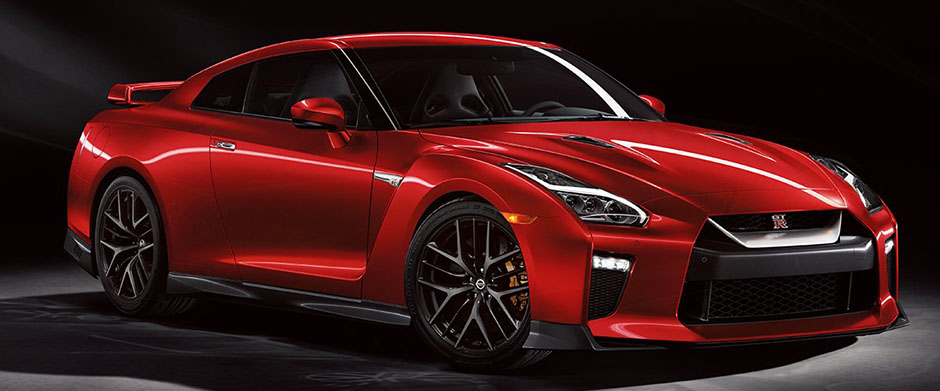
Nissan GT-R Dealer in Manchester
Nissan PERFORMANCE 
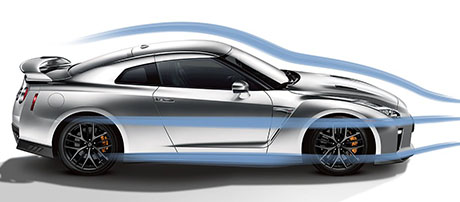
A Supercar That Sculpts The Wind
Relentless tuning of the GT-R's aerodynamics maintains its incredibly clean coefficient of drag to a super-slippery 0.26, yet provides consistent downforce. While you see a substantial, powerful supercar, to the wind, it punches through the air like a low-slung, mid-engine supercar. Pure aerodynamic alchemy.
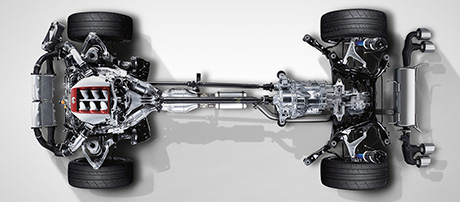
Premium Midship Platform
In another break with convention, Nissan GT-R's Premium Midship Platform places the engine farther back in the chassis for better handling. This unique layout also mounts the transmission with the transfer case in the rear of the Nissan GT-R, creating the world’s first independent rear transaxle for an All-Wheel Drive vehicle.
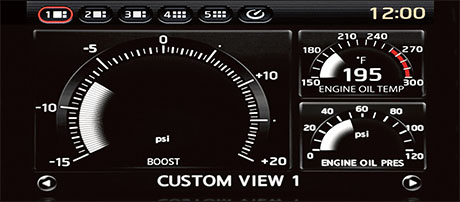
Traveling At The Speed Of GT-R
Once again, GT-R rethinks the way the driver receives information. Multiple, easily accessed screens are an innovative way the driver can get immediate feedback to key performance parameters. The result is engaging and informative – providing quick readability combined with the flexibility of multiple customizable displays.
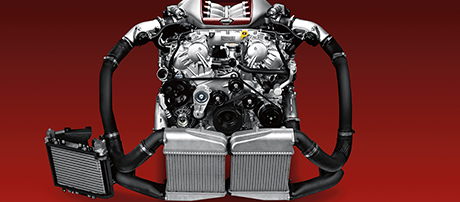
565-HP VR38 Twin-Turbo Engine
An engine designed to answer the demands of a supercar for the 21st century, the VR38 is high-performance, while being ideally-sized for lighter weight and optimal placement in the chassis.
2018 GT-R APPEARANCE 
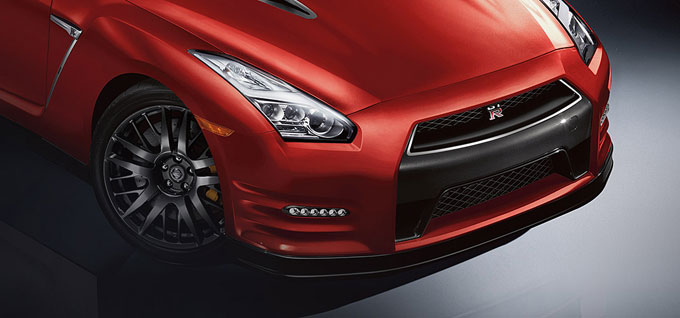
Multi-LED Headlights
The headlights feature four LED units to create an extremely natural light, replicating daylight, while also offering increased illumination. The super-wide-beam headlights expand the area of illumination toward the sides of the car, enhancing visibility, especially when cornering.
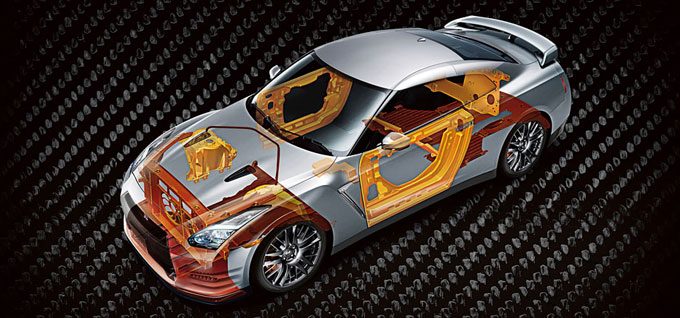
Multi-Material Body Structure
The GT-R's body gets maximum strength from Carbon Aluminum Die-cast Steel, a combination of carbon fiber, die-cast aluminum and steel. For structural rigidity, aluminum die-cast door inner panels are employed to decrease the amount of deformation during a crash. Die-cast aluminum is also used for the front strut housing and in the front suspension. For added structural rigidity, the suspension’s strut tower bar is made of lightweight carbon composite containing aluminum honeycomb.
Nissan GT-R COMFORT 
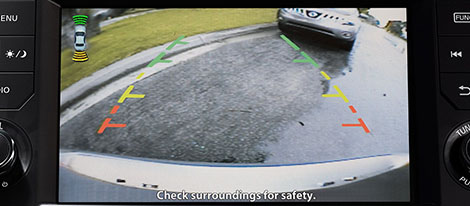
Rearview Monitor
With the rear view monitor, when you back up, a camera mounted discreetly on the rear of the vehicle helps you see what's directly behind you.
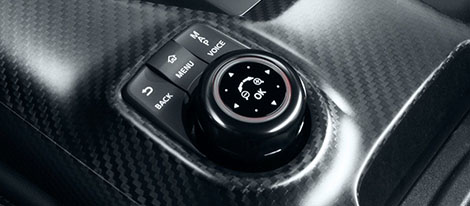
More Than One Way To Command The Display
In addition to its touch functionality, you can control the 8" touch-screen using the Display Commander. Positioned just behind the gearshift, it lets you toggle up and down, side to side, rotate, scroll through and control your infotainment system, all without the need to look down or touch the display screen.
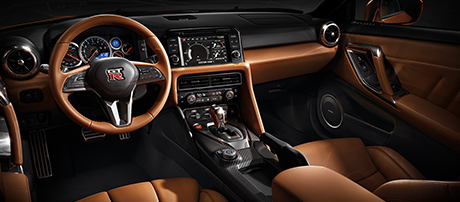
Completely Captivating
A tradition of craftsmanship makes the GT-R a supercar that will take your breath away – even when sitting still. Available semi-aniline leather appointments on the center console, door panels, and shift lever surround you in comfort, while available semi-aniline leather and double-stitching on the seats are a tactile and visual feast.
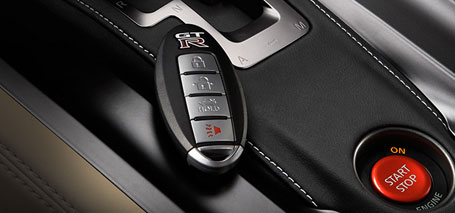
Nissan Intelligent Key®
The Nissan Intelligent Key let you tap a button on the door handle to lock and unlock your Nissan GT-R, while your keys stay in your pocket or purse. With the standard Push Button Ignition feature, you just get in, push the button and go.
2018 Nissan GT-R SAFETY & WARRANTY 
Basic Warranty 36 month / 36,000 miles

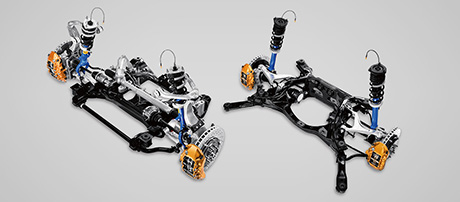
Blistein® DampTronic®
A special Blistein® DampTronic® driver-adjustable shock absorber system utilizes multiple vehicle information systems to provide appropriate damping forces and a high level of control for a variety of driving situations.
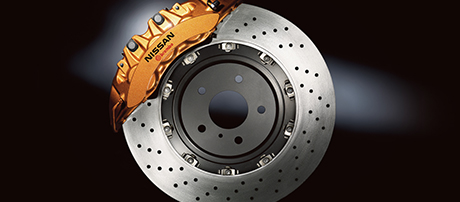
Brake Fast and Safely
The brakes feature 6-piston front and 4-piston rear calipers for stronger, more equal clamping power – something you'd expect to see on an all-out competition machine. For extreme rigidity with light weight, the caliper is machined from a single one-piece "monoblock" of aluminum.
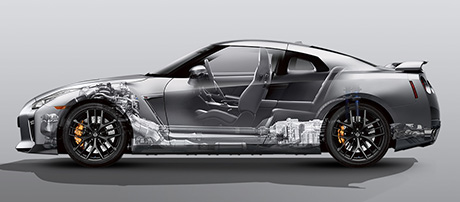
Anywhere. Anytime.
When most supercars stay in the garage or make a hasty retreat from the less-than-ideal conditions, the Nissan GT-R powers through, with one of the most advanced All-Wheel Drive and Vehicle Dynamic Control (VDC) systems ever used in a road car.
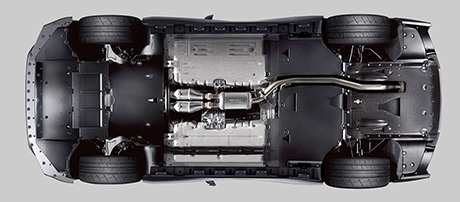
Made To Break All The Rules
The average car has exposed working gear under the car, where wind whips around, creating lift, and slowing you down. The Nissan GT-R, of course, isn't an average car. Its underbody is virtually covered by composite panels, giving it a flat, aerodynamic surface. At the front of the car, the flat underbody is accelerating the air and channeling it over the brakes, cooling them down. At the back, a carbon-fiber diffuser takes that accelerated air and slows it down, creating a vacuum effect that helps the Nissan GT-R stick to the road.



